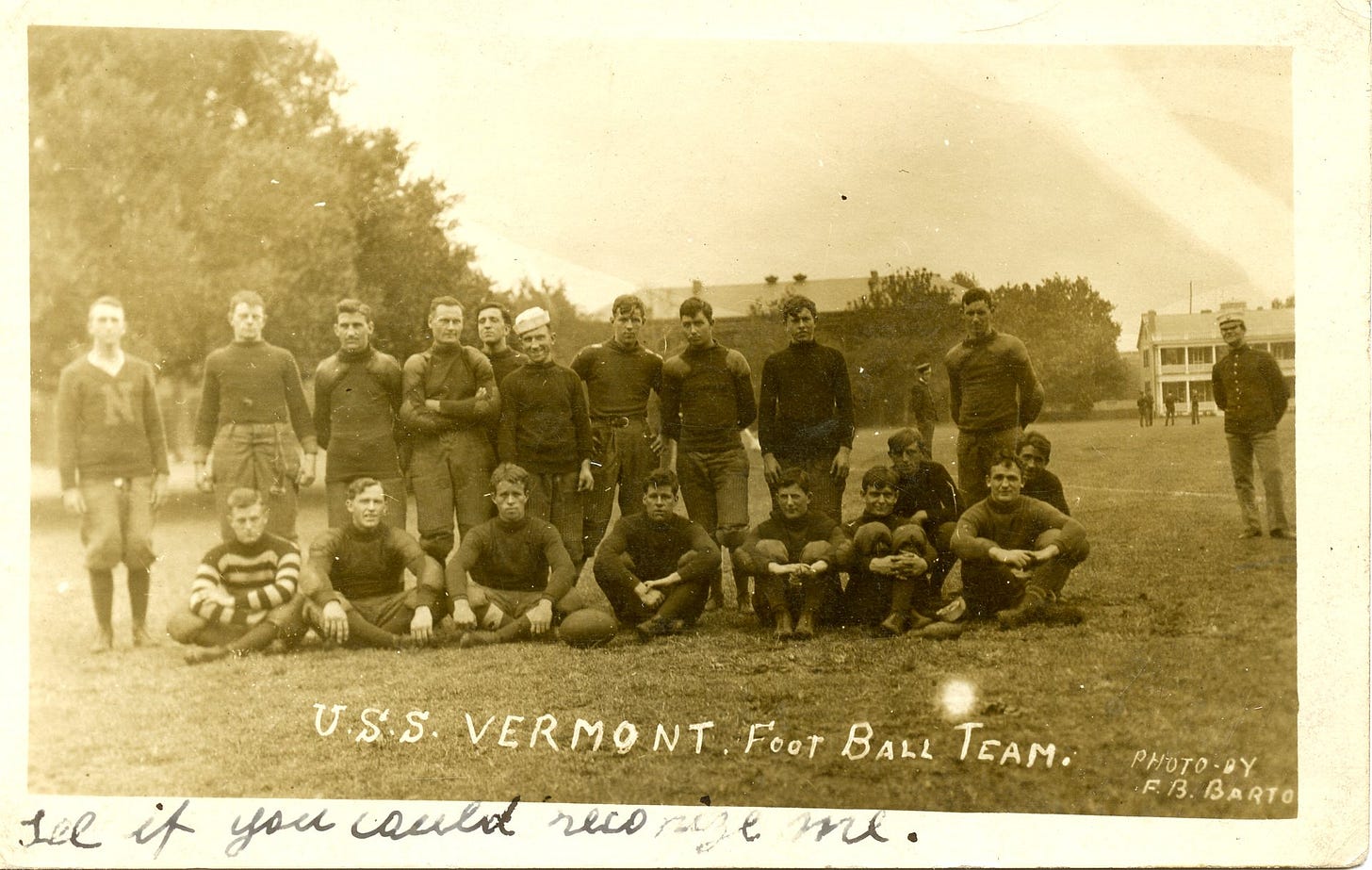Today's Tidbit... Battling For The President's Cup
Football developed mainly in academic settings, but the U.S. military also played a role in the game's spread, especially outside the U.S. For example, the first gridiron football game played in Europe occurred when the U.S.S. Minnesota and U.S.S. Kansas played in Nice, France, in 1909 (see here). Likewise, Army, Navy, and Marine teams first exposed China and other locations to the game played by crazy Americans.
It is not surprising that the military, with many healthy young men, played this role. Before WWI, Navy battleships had crews approaching 1,100, outnumbering the enrollment of many state universities, so plenty of talent was available, with a few officers who likely played at the academy. Tournaments between ships' crews to determine port championships were among football's first playoff games.

Likewise, numerous Army bases fielded teams, and there was a spurt of football played by National Guard units along the Mexican border in 1916 and 1917. Finally, America's entry into WWI led to football being played at virtually every military installation in the country and was widespread in France post-Armistice.
As millions mustered out of the service after WWI, football continued to be played by those remaining in the service, with the Army and Navy fielding ship, base, and all-star teams that competed for East and West Coast championships. The championship game on the West Coast came on Armistice Day (see here), first at Tournament Park in Pasadena and then at Berkeley's California Field.
The East Coast also played a championship game between an all-star team or the best base team within the Third Army Corps, which covered most of the East Coast, and the East Coast Navy's best team, which proved to be the Quantico Marines nearly every year. Played in Baltimore or Washington, D. C., the week after the Army-Navy game, the game initially included officers and enlisted men. However, it changed to an all-enlisted format in 1924 under the premise that the officers had the opportunity to play big games in college. Later, they allowed one officer on the field at a time.
Besides the up to 50,000 attendees, presidents, their wives, cabinet secretaries, and other government officials attended the games. In 1924, Calvin Coolidge donated a silver cup to be awarded on a traveling basis to the winning team, resulting in the game becoming known as the President's Cup.

Unfortunately for the series, it was seldom competitive. The Quantico Marines, later the All Marines team, won nine of ten games on the East Coast.
1921: Quantico Marines 20 Third Corps 0 @ Baltimore's Homewood Stadium (Dwight Eisenhower was the Army head coach)
1922: Quantico Marines 13 Third Corps 12 @ Baltimore's Venable / Municipal Stadium
1923: Quantico Marines 7 Third Corps 0 @ Washington, D. C.'s Griffith Stadium
1924: Quantico Marines 47 Third Corps 0 @ Washington, D. C.'s Griffith Stadium
1925: Quantico Marines 20 Fort Benning 0 @ Washington, D. C.'s Griffith Stadium
1926: All Marines 27 Fort Benning 7 @ Washington, D. C.'s Brookline Stadium (Catholic U.
1927: All Marines 14 All Army 0 @ Washington, D. C.'s Brookline Stadium (Catholic U.)
1928: Newport (R.I.) Naval Training 10 All Marines 0 @ Washington, D. C.'s Griffith Stadium
1929: All Marines 19 Coast Guard 0 @ Quantico
1930: All Marines 10 Coast Guard 0 @ Griffith Stadium
The Army deemphasized all-star football teams in the mid-1920s, as did the Navy a few years later. Yet, the Newport Naval Training team gave the Marines their only loss in 1928. After the Navy dropped from the competition, the Marines scheduled games with the Coast Guard in 1929 and 1930 because Herbert Hoover wanted the President's Cup games to continue.
After 1930, even the Marines eliminated their all-star team in favor of base teams. At that point, the most active base football occurred on the West Coast, so the President's Cup transferred there for a few years, but it was not the same without the President and other officials attending the game. In addition, the President's Cup could not compete with the West Coast's longstanding Armistice Day game, and the President's Cup game soon faded away.
Football Archaeology is reader-supported. Click here to buy one of my books or otherwise support the site.






